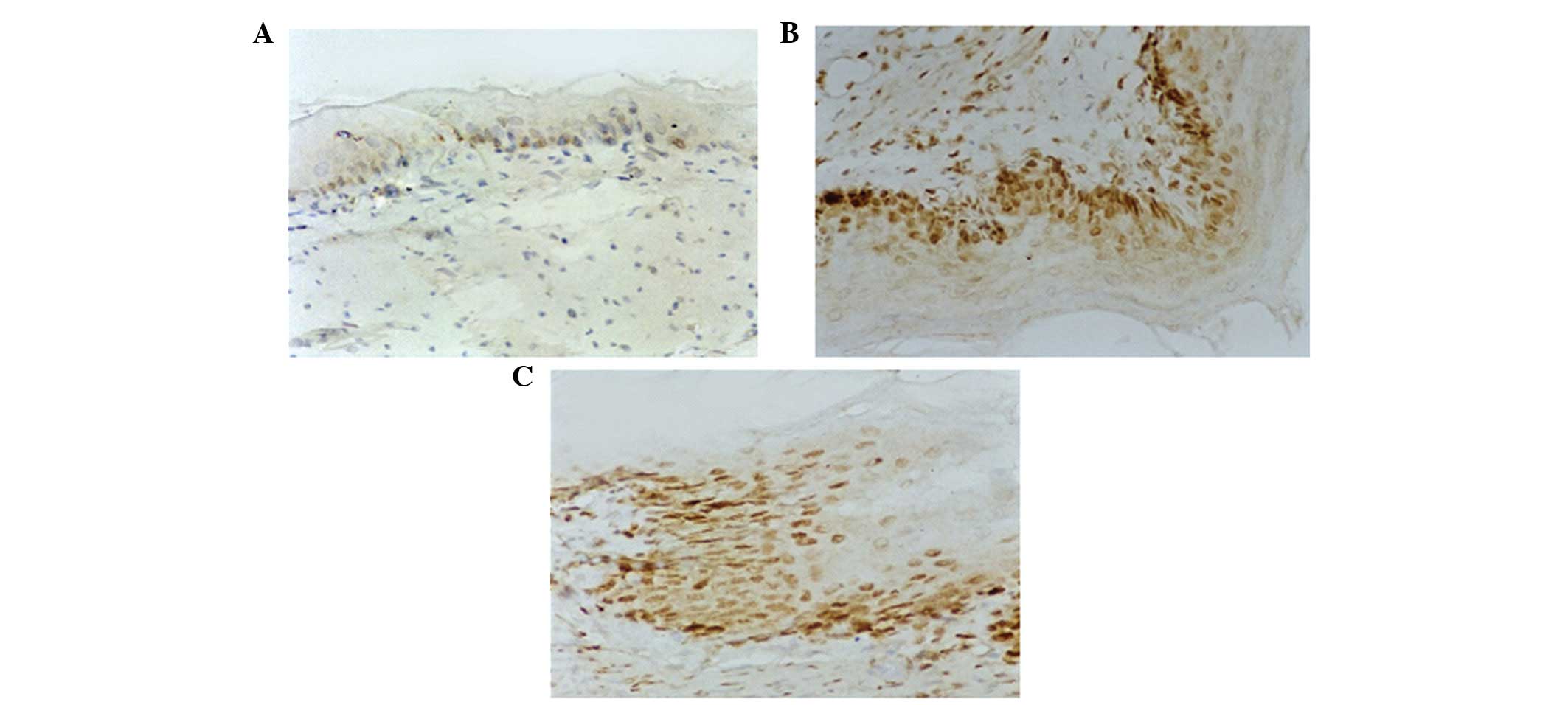|
1
|
Zhang X, Wang F, Wang J, et al:
Experimental lung carcinoma induced by fungi and mycotoxins - a
review. Beijing Da Xue Xue Bao. 35:4–6. 2003.(In Chinese).
|
|
2
|
Versilovskis A and De Saeger S:
Sterigmatocystin: occurrence in foodstuffs and analytical methods -
an overview. Mol Nutr Food Res. 54:136–147. 2010. View Article : Google Scholar : PubMed/NCBI
|
|
3
|
Zhang XH and Xue LY: Carcinogenicity and
biological effectiveness of sterigmatocystin. Zhonghua Bing Li Xue
Za Zhi. 38:136–138. 2009.(In Chinese).
|
|
4
|
Xing LX, Zhang XH, Shen HT, et al:
Experimental study on the carcinogenic effects of sterigmatocystin
in new born BALB/c mice. Zhonghua Bing Li Xue Za Zhi. 36:265–266.
2007.(In Chinese).
|
|
5
|
Nakajima M, Kato H, Miyazaki T, et al:
Tumor immune systems in esophageal cancer with special reference to
heat-shock protein 70 and humoral immunity. Anticancer Res.
29:1595–1606. 2009.PubMed/NCBI
|
|
6
|
Abdel-Latif MM, Duggan S, Reynolds JV and
Kelleher D: Inflammation and esophageal carcinogenesis. Curr Opin
Pharmacol. 9:396–404. 2009. View Article : Google Scholar : PubMed/NCBI
|
|
7
|
Xu JY, Zhang JK and Wang RM: Control
observation on esophageal carcinoma and esophagitis detected by
endoscopy between high and low incidence areas of esophageal
carcinoma. Chin J Clin Gastroenterol. 7:101–103. 1995.(In
Chinese).
|
|
8
|
Ho JA and Durst RA: Detection of fumonisin
B1: comparison of flow-injection liposome immunoanalysis with
high-performance liquid chromatography. Anal Biochem. 312:7–13.
2003. View Article : Google Scholar : PubMed/NCBI
|
|
9
|
Huang X, Zhang X, Yan X and Yin G: Effects
of sterigmatocystin on interleukin-2 secretion of human peripheral
blood mononuclear cells in vitro. Wei Sheng Yan Jiu. 31:112–114.
2002.(In Chinese).
|
|
10
|
Tong P, Zhang X, Yan X, Wang JL and Zhang
GJ: Effects of sterigmatocystin on the expression of HLA class I in
esophageal squamous cells in vitro. Chin J Exp Surg. 23:583–584.
2006.(In Chinese).
|
|
11
|
Yu ZL: Reflux esophagitis diagnostic
criteria and the existing problems. J Chin Med. 39:151–152.
2000.(In Chinese).
|
|
12
|
Fiocca R, Mastracci L, Riddell R, et al:
Development of consensus guidelines for the histologic recognition
of microscopic esophagitis in patients with gastroesophageal reflux
disease: the Esohisto project. Hum Pathol. 41:223–231. 2010.
View Article : Google Scholar
|
|
13
|
Yuan S and Brookes SJ: Neuronal control of
the gastric sling muscle of the guinea pig. J Comp Neurol.
412:669–680. 1999. View Article : Google Scholar : PubMed/NCBI
|
|
14
|
Miller L, Dai Q, Vegesna A, et al: A
missing sphincteric component of the gastro-oesophageal junction in
patients with GORD. Neurogastroenterol Motil. 21:e813–e852. 2009.
View Article : Google Scholar : PubMed/NCBI
|
|
15
|
Xu Z, Hu T and Liu W: A new procedure in
making reliable experimental models of gastroesophageal reflux.
Zhongguo Xiu Fu Chong Jian Wai Ke Za Zhi. 18:288–290. 2004.(In
Chinese).
|
|
16
|
Rohof WO, Hirsch DP and Boeckxstaens GE:
Pathophysiology and management of gastroesophageal reflux disease.
Minerva Gastroenterol Dietol. 55:289–300. 2009.PubMed/NCBI
|
|
17
|
Zhu SC, Li R, Wang YX, Feng W, Li J and
Qiu R: Impact of simultaneous assay, the PCNA, cyclinD1, and DNA
content with specimens before and after preoperative radiotherapy
on prognosis of esophageal cancer-possible incorporation into
clinical TNM staging system. World J Gastroenterol. 11:3823–3829.
2005.
|
|
18
|
Bandoh N, Ogino T, Katayama A, et al: HLA
class I antigen and transporter associated with antigen processing
downregulation in metastatic lesions of head and neck squamous cell
carcinoma as a marker of poor prognosis. Oncol Rep. 23:933–939.
2010. View Article : Google Scholar : PubMed/NCBI
|
|
19
|
Belicha-Villanueva A, Blickwedehl J,
McEvoy S, Golding M, Gollnick SO and Bangia N: What is the role of
alternate splicing in antigen presentation by major
histocompatibility complex class I molecules? Immunol Res.
46:32–44. 2010. View Article : Google Scholar : PubMed/NCBI
|
|
20
|
Medina F, Ramos M, Iborra S, de Leon P,
Rodriguez-Castro M and Del Val M: Furin-processed antigens targeted
to the secretory route elicit functional TAP1−/−CD8+ T lymphocytes
in vivo. J Immunol. 183:4639–4647. 2009.PubMed/NCBI
|
|
21
|
Herget M, Kreissig N, Kolbe C, Schölz C,
Tampé R and Abele R: Purification and reconstitution of the antigen
transport complex TAP: a prerequisite for determination of peptide
stoichiometry and ATP hydrolysis. J Biol Chem. 284:33740–33749.
2009. View Article : Google Scholar : PubMed/NCBI
|
|
22
|
Atkins D, Ferrone S, Schmahl GE, Störkel S
and Seliger B: Down-regulation of HLA class I antigen processing
molecules: an immune escape mechanism of renal cell carcinoma? J
Urol. 171:885–889. 2004. View Article : Google Scholar : PubMed/NCBI
|
|
23
|
Seliger B, Atkins D, Bock M, et al:
Characterization of human lymphocyte antigen class I
antigen-processing machinery defects in renal cell carcinoma
lesions with special emphasis on transporter-associated with
antigen-processing down-regulation. Clin Cancer Res. 9:1721–1727.
2003.
|


















